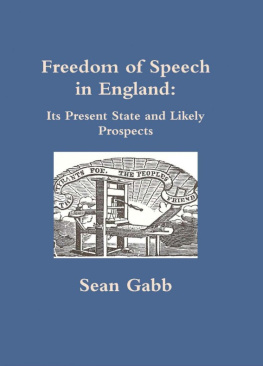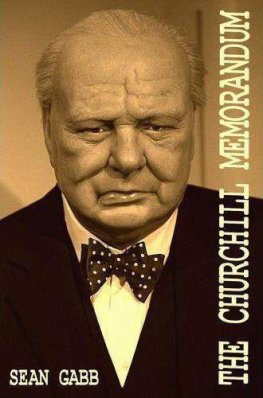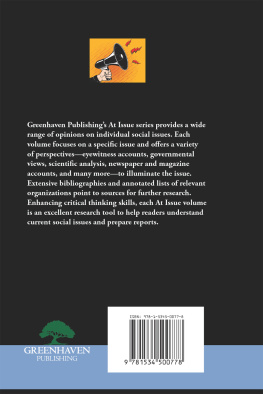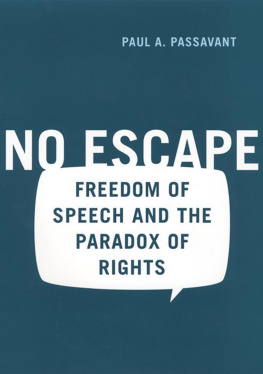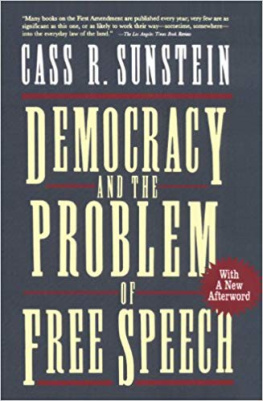Freedom of Speech inEngland:
Its Present State and Likely Prospects
Twenty Essays with
an Introductory Overview
By Sean Gabb
Copyright Sean Gabb2014
Smashwords Edition
(This book is also available inhard copy at all good booksellers)
(Please see the at theend of this book)
This e-book is licensed for yourpersonal enjoyment only. It may not be resold or given away toother people. If you would like to share this book with someoneelse, please buy an additional copy. If you are reading this book,and did not buy it, or if it was not bought for your use only,please go to your favourite on-line bookseller and buy your owncopy. Thank you for respecting my hard work in writing thisbook.
Contents
Introduction
This book is a collection of essays in defence offreedom of speech, written and published between 1992 and 2012.Instead of by date, I have arranged the essays in loose thematicorder. Since my political views have barely changed since I was aboy, I see no problem in such an arrangement. It allows areasonably smooth exposition of my views. It also gives emphasis tomy claim that freedom of speech ought to be defended as aconsistent whole, regardless of who is saying what. Even so, theseare twenty essays, written over many years, each one addressing aspecific issue. I think it would be useful for this Introduction togive a short and connected overview of what I believe.
A Case for Freedom ofSpeech
I believe in the freedom topublish anything that is not a trespass against some legitimateprivate right, or that does not clearly and immediately endangerthe survival of my country. I should not be free to reveal yourprivate confessions to me of inadequacy; or to publish your ownwork under my name; or to tell people you are a shoplifter if youare not one; or to say that treasure beyond value is buried sixfeet below your flowerbeds. I should not be free, in time of war,or in reasonable prospect of war, to publish my governmentsdefence plans. I will also mention the contempt of court laws, andcontractual agreements to remain silent. I know that the lawscovering these particular trespasses have often been stretched fromprotection to censorship. I know very well that laws to protectstate secrecy will, unless tightly drawn and continuouslymonitored, be made into a device to cover up various kinds ofwrongdoing. But I see no difficulty with the principle of suchlaws, so long as they only serve their stated purpose. Outsidetheir proper range, there should be no limits on what may bepublished.
For libertarians, this may be nomore than a special case of the general principle that we should befree to do with ourselves and our property as we please. There aredifficulties with this principle, of self-ownership. When does achild become an autonomous person? What kinds of property, andmodes of acquisition, should be regarded as legitimate? Sincevirtually everything we do has some effect on others, where shouldthe boundaries be drawn between free use of oneself and abuse ofothers? But, these difficulties being settled in any of the usualways, freedom of speech becomes just another application of theprinciple. You have the right to buy a computer, and to create onits hard disk whatever you like. You have the right to pass this toanyone else by mutual consent. Your right to freedom of speech isof exactly the same kind as your right to start a window cleaningbusiness, or to dye your hair green, or to make bets on the futureprice of corn, or to change sex. You may find it convenient, nowand again, to claim a right to freedom of speech. But this isnever more than a derivation from the one true right, which is toself-ownership.
Even with its meaning settled,however, self-ownership is a defence of limited value. In the firstplace, not everyone else is a libertarian. People who believe in aminimum wage and drug prohibition, or who like heavy taxes onothers and lavish state spending on public services, are unlikelyto think much in practice of the self-ownershipprinciple.
In the second place,self-ownership does not, in itself, imply toleration. Whoever doesaccept it must oppose censorship by the state, or other aggressionsagainst the free use of property. But he is not required to shrugand look the other way if those he can influence say something hefinds disagreeable. If he is an employer, he can sack people whosereligious or political views are different from his owneven ifthese views are stated wholly off the job. If he is a landlord, hecan evict dissenting tenants. He can organise boycotts of peopleand businesses. So long as he does not positively aggress againstothers, he can be a most unpleasant and effective bigot. Therewould, in a libertarian society, be no shortage of other workingarrangements and places to live. But finding these is never free ofopportunity cost; and it is conceivable that a libertarian societythat accepted only the self-ownership principle would be generallyhostile to individuality in the arts and sciences and in dailylife. This is not the same as burning people at the stake, orherding them into concentration camps. There would always be theoption for like-minded dissidents to form their own communities.The point I am making, though, is that libertarians have noinherent duty to be open-minded, or to tolerate things they do notlike.
My preferred defence of freedomof speech, therefore, is the formally separate argument of socialutility. I agree with John Stuart Mill that truth and progress arebest served by the active toleration of all opinions, no matter howodd or offensive others may find them.His argument comprises two basic claims.
First , an opinion universally held in our own timeand place may be false, and an apparently false opinion may betrue. There are few of us who did not once believe things that wenow reject. There are many instances of presently received opinionslaughed at and their discoverers persecuted. Galileo died underhouse arrest for asserting that the Earth went round the Sun. TheGerman National Socialists drove physicists into exile or idlenessfor refusing to denounce the Jewish myth of theinterchangeability of energy and matter. The Soviet Socialistskilled those biologists who denied, against Lysenko, that acquiredcharacteristics in living things were transmissible to the nextgeneration.
Leaving aside state persecution,there must be thousands more instances where opinions now receivedhave been rejected, for seemingly good reasons, by men of learningand ability. I think of Wegeners theory of continental drift, orthe bacterial cause of many stomach ulcers, or the slow demolition,between the first appearance of syphilis and Pasteursinvestigation of microbes, of the miasma theory of epidemics. Thereare many more received opinions waiting to be overthrownsometimesby new opinions, sometimes by the reinstatement of what theyreplaced. Perhaps much cancer is caused by viral infections.Perhaps homosexuality is indeed a mental illness. Perhaps the worldis not, after all, more than a few thousand years old.
We can never be sure about anyclaim that relies on evidence about matters of fact and itsinterpretation. The more open we are to alternative theories, thecloser we are likely to approach to the truth. Moreover, truth, inour civilisation, is not only good in itself. For about three and ahalf centuries, we have enjoyed a continuous and acceleratingimprovement in our lives, produced by uncovering the forces ofnature and turning these to our benefit.
Second , even if an opinion is false beyond allreasonable doubt, to suppress it is to deprive us or what Millcalls [a]lmost as great a benefit, the clearer perception andlivelier impression of truth, produced by its collision witherror. Protect the most solidlybased truth with penal laws, and faith in it will insensiblywither.
Take, for instance, a case givenby J.A. Froude. Some time around 1860, a school inspector wrote to
Next page
